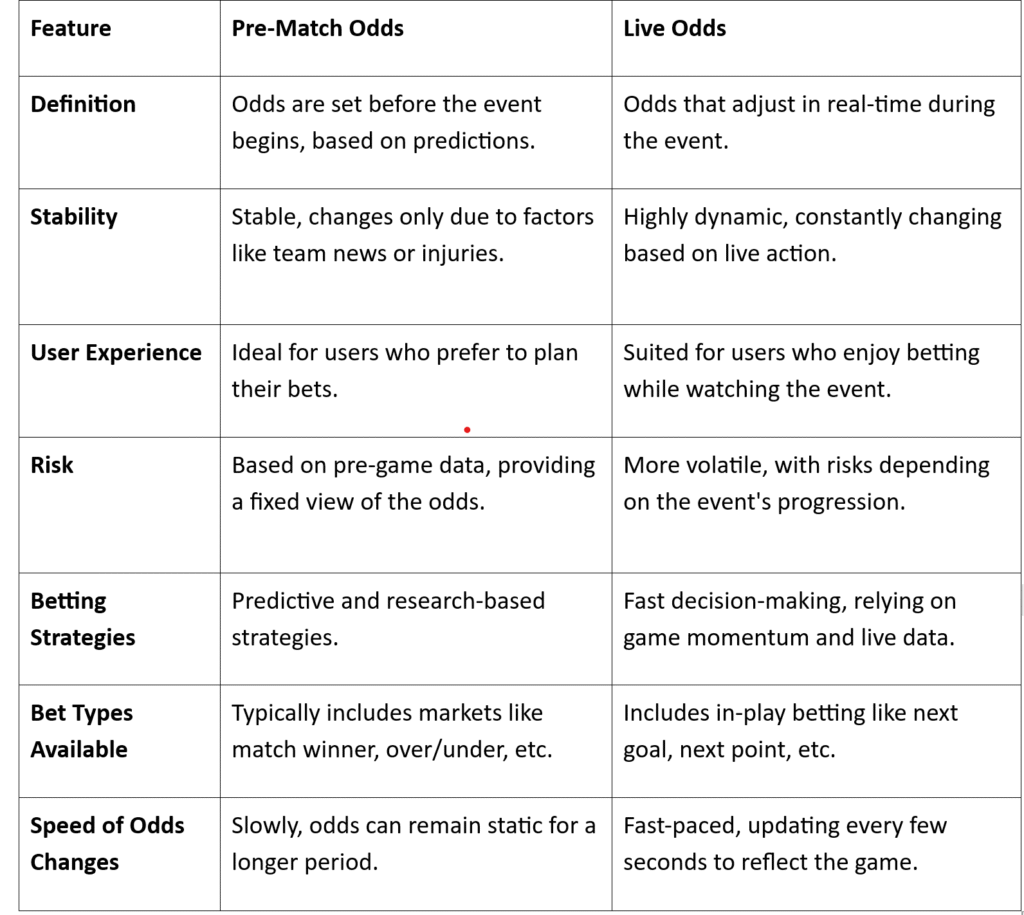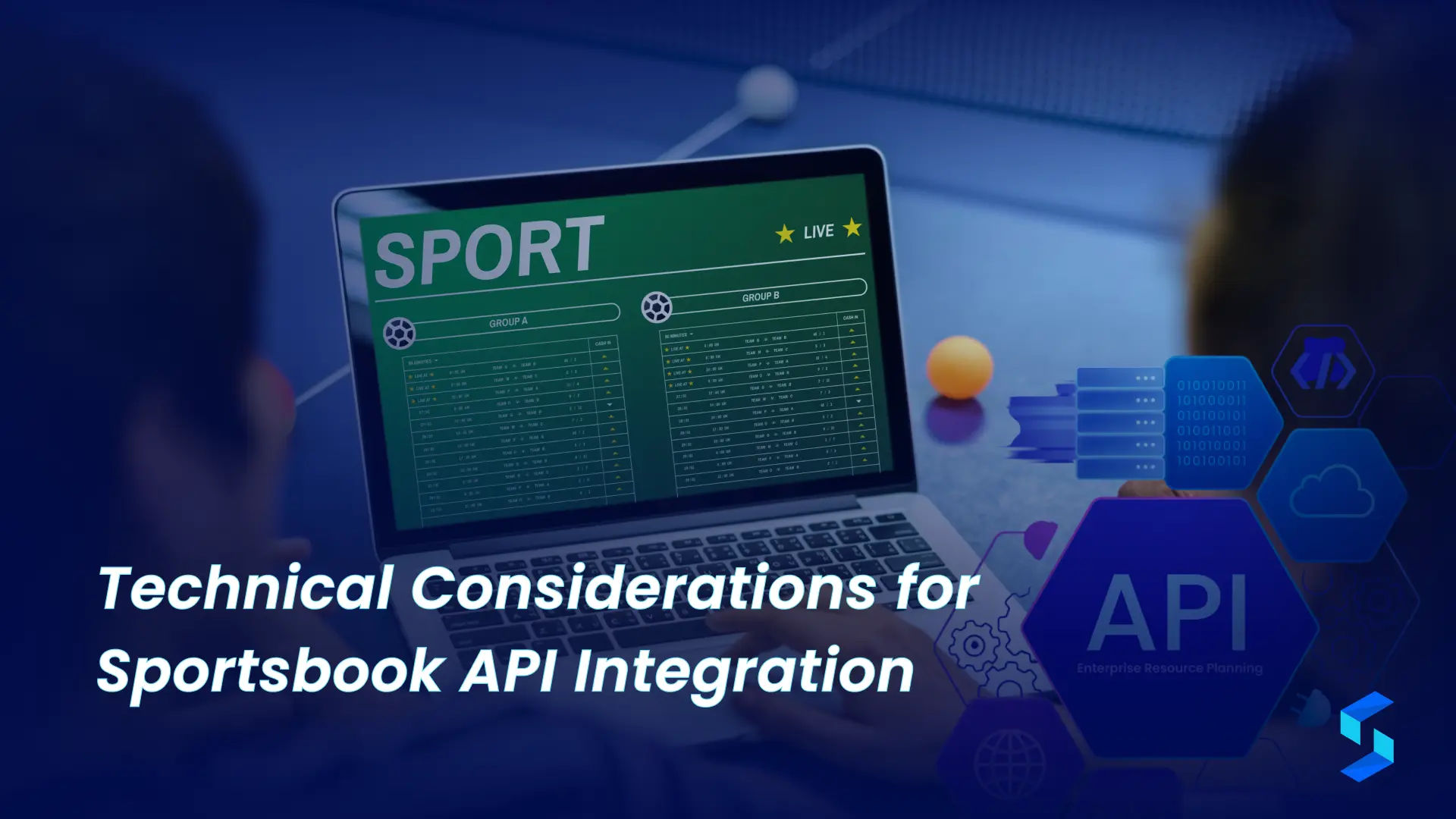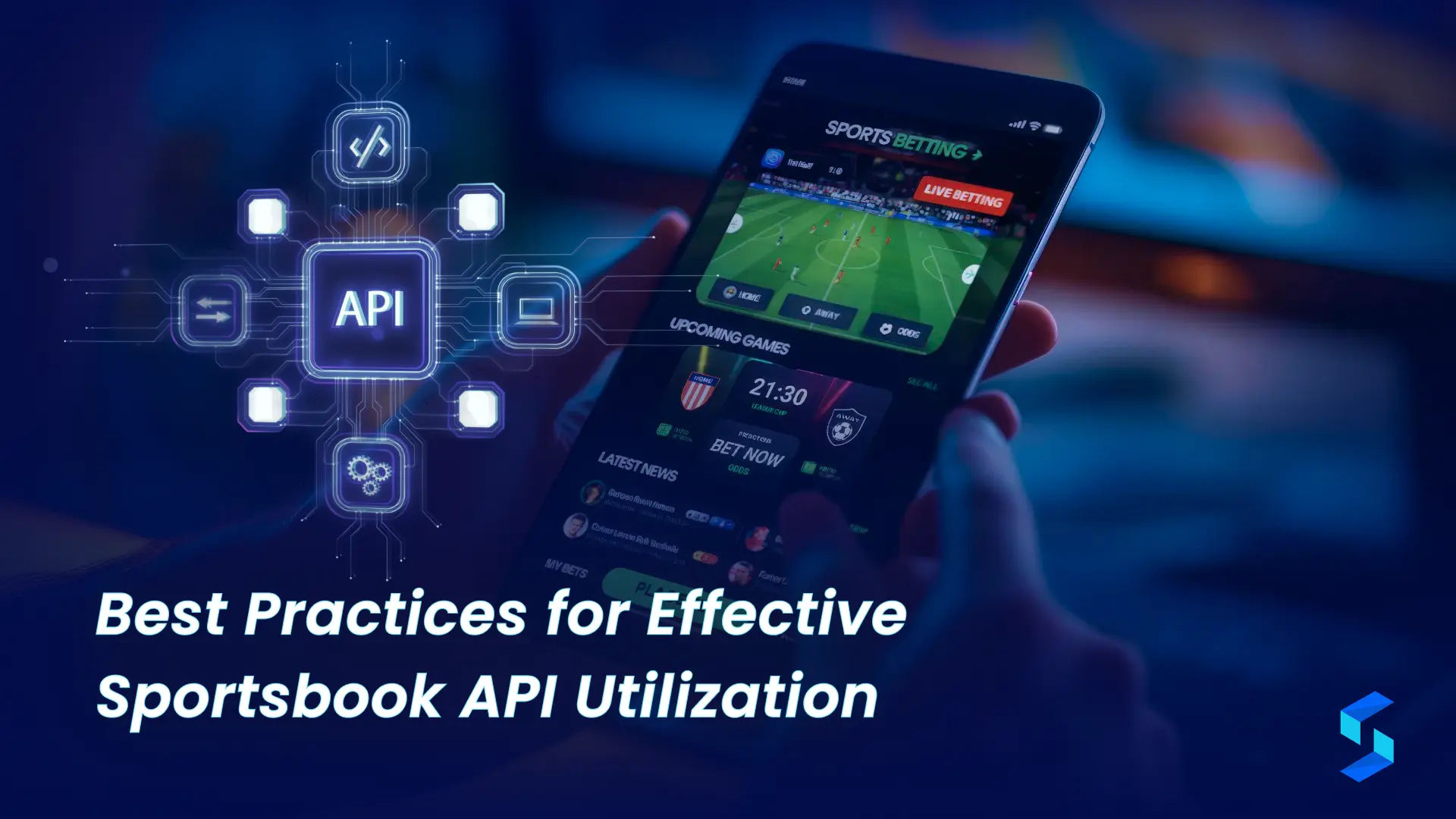- In 2024, legal bettors in the U.S. wagered a record $142.5 billion, with operators holding $13.2 billion, or 9.3% in revenue.
- Gamification Enhances User Interaction: Implementing gamification strategies can boost platform interaction by up to 13%, increase social sharing by 22%, and enhance content discovery by 68%.
In this blog, we’ll break down how sportsbook APIs work, why they’re essential, and how they can unlock new revenue streams for your business.
What is a Sportsbook API?
A Sportsbook API is a key tool for adding sports betting features to your online casino or betting platform.
It provides access to real-time odds, markets, and event data from various sources, enabling you to offer an up-to-date and dynamic betting experience for your users.
By incorporating both pre-match and live betting capabilities, operators can deliver a full sports betting service without building a complex system from the ground up.
Integrating a sportsbook API simplifies the process, reduces development time, and creates a scalable solution that grows with your business.
Benefits of Integrating a Sportsbook API for iGaming Businesses
Integrating a sportsbook API is crucial for iGaming businesses aiming to enhance their platform’s functionality and user experience.
This section outlines how API integration can expand market offerings, provide real-time data for live betting, improve operational efficiency, and ensure scalability to handle high traffic. Let’s take a look at the benefits:
- Expand Market Offerings: With the right sportsbook API, you can support a wide range of sports, from football to esports. This can increase the variety of betting options for your users and attract a diverse player base.
- Real-Time Data & Live Betting: Access to real-time data means you can offer live odds and dynamic markets that adjust based on live game outcomes. Live betting is one of the fastest-growing segments in the online sports betting market.
- Efficiency and Speed: Instead of investing time and resources into building a sportsbook platform from scratch, API integration provides a streamlined solution for quick implementation. This allows you to go to market faster and reduce operational costs.
- Scalability: APIs can support high user traffic, especially for major sporting events. As your platform grows, a well-integrated sportsbook API ensures smooth operation, even during peak times.
While integrating a sportsbook API brings clear advantages, not every solution delivers the same value. From latency to customization, the finer details can shape how users interact with your platform and whether they keep coming back. So, what should you be looking for when choosing an API? Let’s break down the key differences.
How Do Sportsbook APIs Differ?

Understanding the differences between sportsbook APIs is crucial because the right choice can directly impact your platform’s performance, user engagement, and profitability.
By evaluating various factors such as latency, odds quality, customization options, market offerings, and data depth, you can ensure that your API integration aligns with your platform’s goals and provides a seamless, competitive betting experience. Here’s what you need to know:
1. Latency
For in-play betting, speed is everything. The best APIs offer the lowest latency, ensuring that odds updates and bet confirmations happen as quickly as possible.
Real-time data sourced directly from the sports stadiums, with near-zero latency, offers a significant advantage over feeds delayed by TV broadcasts.
A fast, reliable odds feed will help you drive greater turnover by reducing bet suspensions and delays, enhancing the overall betting experience.
2. Odds Quality
Accurate odds are essential for your sportsbook’s long-term profitability. The best APIs rely on advanced trading models that simulate sporting events and predict outcomes with precision.
By offering the most accurate odds, you can prevent arbitrage betting from sharp punters and ensure your odds reflect true probabilities. This level of accuracy, combined with effective risk management strategies, will help optimize your sportsbook’s profits.
3. Customization Options
Flexibility in customizing odds, markets, and features is crucial. The right API allows you to adjust and tailor offerings to meet your platform’s unique needs and users’ preferences.
Whether it’s personalizing odds formats, bet types, or UI elements, an API with robust customization options ensures your sportsbook can stand out.
4. Market-Type Offering
Another important consideration is the variety and types of markets available in your sportsbook. Some APIs offer a wide range of markets across different sports, while others may specialize in specific niches.
Depending on your target audience, you’ll want to choose an API that supports the types of bets that will attract and engage your users.
5. Depth
The depth of data provided by the API, including detailed statistics, player information, and live event data, can significantly enhance the betting experience.
APIs with more extensive data offerings allow you to create a richer, more engaging environment for your users, which can increase engagement and retention.
By carefully evaluating these factors, you’ll be able to choose the sportsbook API that best fits your platform’s needs and offers the best user experience.
Once you’ve zeroed in on the right API, there’s another layer that deserves your attention—odds data. After all, no matter how feature-rich your integration is, the core of any sportsbook lies in the odds it offers. Let’s explore how odds data works within a sportsbook API and why understanding it is vital for building a profitable betting platform.
Understanding Odds Data in Sportsbook APIs
Understanding odds is crucial if you’re entering sports betting or enhancing your platform with a sportsbook API.
Odds determine a bet’s potential payout, and they are available in different formats depending on the region.
Integrating odds data through an API means you’ll have real-time access to the most accurate and up-to-date information available.
Types of Odds Offered in Sportsbook APIs
There are a few different ways to express odds, and sportsbooks often use multiple formats. Here’s a quick breakdown of the most common types:
- American Odds: Often used in the U.S., these are represented as either a positive (+) or negative (-) number. A positive number shows how much profit you’d make on a $100 bet, and a negative number shows how much you’d need to bet to make $100 profit. For example, +200 means you’d win $200 on a $100 bet, while -150 means you’d need to bet $150 to win $100.
- Decimal Odds: Popular in Europe and Canada, decimal odds represent the total payout (bet amount + profit) for every $1 wagered. For example, 2.50 means a $1 bet will return $2.50 (including the original wager).
- Fractional Odds: Common in the UK, fractional odds show the profit relative to the stake. For example, 5/1 means you win $5 for every $1 bet. If the odds are 1/2, you’d win $1 for every $2 wagered.
Real-Time Updates and Importance of Current Odds Data
In sports betting, timing is everything. Odds can change rapidly based on factors like in-game events, injuries, or shifts in public betting.
Real-time odds updates through an API ensure that bettors always have access to the most accurate and up-to-the-minute information.
Why is this important? Offering live odds lets your platform provide a dynamic, engaging betting experience that reflects the latest developments.
If your platform isn’t updated in real time, you risk offering outdated information, which could lead to a poor user experience or even financial loss.
Accessing Historical Odds Data via APIs
Sports betting involves not only providing live odds but also understanding trends and patterns over time. Many sportsbook APIs offer access to historical odds data, which can be essential for both operators and users.
This data allows you to track past betting patterns and analyze market movements, which can provide valuable insights into betting behavior.
Integrating historical odds into your platform offers several key advantages:
- Analyze Past Betting Patterns: Historical data allows for the identification of trends in betting behavior, helping to forecast potential outcomes based on previous events. This can be beneficial for adjusting betting strategies and improving market predictions.
- Create Betting Markets Based on Past Performance: By leveraging historical data, you can offer betting markets that reflect past performance, such as odds based on team or player statistics. This adds variety to the betting options and can increase user engagement.
- Provide Analytics for Informed Decisions: Historical odds data enables the generation of detailed reports and analytical tools, helping users make more informed betting choices. Offering this data enhances the platform’s value by giving users the tools to analyze and evaluate potential bets based on past performance.
- Support Customized Betting Experiences: Users who follow specific teams, players, or leagues may benefit from access to historical data. This allows them to track long-term trends, making their betting experience more personalized and aligned with their interests.
By integrating historical odds into your platform, you can offer users a deeper layer of analysis that goes beyond the current moment and into the bigger picture.
Suggested Read: Sports Betting UI Templates and Projects
Odds tell the story of a game in numbers—but they’re just one part of what makes a sportsbook API powerful. To truly elevate your platform, you need to look beyond the numbers and understand the full toolkit an API brings to the table. From bet settlement logic to risk management tools, let’s explore the key features that separate a basic integration from a best-in-class betting experience.
Key Features of Sportsbook APIs

Understanding the key features of sportsbook APIs helps operators assess how well an integration can serve their platform’s needs, both functionally and competitively.
This section outlines the core capabilities that define the value and scope of a sportsbook API, classifying it as a foundational resource for creating a dynamic and user-centric betting experience.
Let’s look at some of the core functionalities you can expect:
1. Market Coverage and Sports Supported
Sportsbook APIs provide access to a wide range of sports and betting markets. From traditional sports like football, basketball, and tennis to more niche markets like esports, rugby, or even politics, API allows you to cover a diverse range of betting options that will attract a wider audience.
This flexibility ensures that your platform can cater to the interests of all types of bettors, enhancing user engagement.
2. Pre-Match vs. Live Odds

One of the most critical features of sportsbook APIs is the ability to offer both pre-match and live odds. While pre-match odds are set before the event starts and are relatively stable, live odds update in real time during the event based on ongoing actions.
This provides bettors with exciting in-play betting opportunities that keep them engaged throughout the game.
To help clarify the differences between these two, here’s a comparison table:

3. User and account management features
A smooth, hassle-free user experience is essential for the success of your sportsbook platform.
Integrating a sportsbook API can give you access to comprehensive user and account management features that help keep everything running effortlessly. Here’s what you can expect:
- Account Registration & Login: Simplify the onboarding process with quick account creation and secure login systems, ensuring an easy entry point for users.
- Payment Processing: Smooth and secure deposit and withdrawal systems ensure a frictionless financial experience for users, improving trust and convenience.
- Betting History Tracking: This feature allows users to review their betting activity, track performance, and monitor trends over time, offering a more personalized experience.
- Responsible Gaming Features: Implement tools like self-exclusion, betting limits, and time-outs, allowing users to manage their behavior responsibly, enhancing trust and loyalty.
- Bonus & Promotions Management: Easily handle and optimize bonuses, free bets, and promotional offers, keeping users engaged and incentivized to return.
These features contribute to a more engaging, secure, and user-friendly platform. They also ensure that your users have full control over their accounts, encouraging retention and improving overall satisfaction.
By offering a seamless user journey from account creation to responsible gaming, you not only build trust but also create a competitive edge in the marketplace.
Ready to integrate the perfect sportsbook API into your platform? SourceCodeLab can help you with top-notch sportsbook API solutions that are tailored to your needs. Start building the ultimate sports betting experience today!
Suggested Read: Get Your Casino & Sportsbook Platform With Source Code Lab
Features are only half the story. Behind every smooth betting experience is a solid technical foundation. From data security to latency management, the way your sportsbook API is integrated can make or break the user experience. Let’s look at the key technical considerations that keep your platform running seamlessly.
Technical Considerations for Sportsbook API Integration

Successfully integrating a sportsbook API goes beyond connecting systems—it requires careful attention to the technical foundations that keep everything running smoothly.
From safeguarding sensitive data to handling large volumes of live betting information, these considerations help ensure your platform performs reliably, securely, and at scale, even under peak demand.
Here, we will explore the essential considerations for effectively integrating a sportsbook API into your platform.
1. API Authentication and Security Protocols
Security is a top priority when integrating any API, especially in the iGaming industry, where user data, including personal and financial information, must be protected.
Security Measures for API Integration:
- OAuth Authentication: OAuth is widely used for API authentication, allowing you to securely exchange tokens for authorized access to sensitive data.
- Encryption: All data exchanged between the platform and the sportsbook API should be encrypted using SSL/TLS protocols. This ensures that user data remains secure during transmission.
- Rate Limiting: Rate limiting helps prevent system abuse, protecting the API from overloads or denial-of-service attacks.
- Two-Factor Authentication (2FA): Adding 2FA for administrative logins and user authentication can add an extra layer of security to your platform.
Did you know? According to IBM’s 2024 report, the global average cost of a data breach is $4.88 million. This cost can be even higher in industries like iGaming, where sensitive data and financial transactions are involved.
2. Handling Large Volumes of Data and Ensuring Scalability
Sports betting platforms handle a vast amount of data, especially when it comes to live odds, market changes, and player bets.
Ensuring that the API can handle these data loads without affecting platform performance is essential.
Strategies for Managing High Data Volumes:
- Data Caching: Caching frequently accessed data helps reduce the load on the API and speeds up data retrieval. It minimizes the need to constantly query the API for the same data.
- Horizontal Scaling: Adding more servers as traffic increases helps distribute the workload and ensures that your platform can handle larger volumes of data.
- Cloud Solutions: Cloud-based storage and processing allow for dynamic scaling, meaning that resources can be adjusted based on demand, ensuring smooth performance even during high-traffic periods.
- API Load Balancing: Distribute API requests across multiple servers to ensure that no single server is overloaded, which helps maintain uptime and performance during peak traffic periods.
Did you know? 53% of website visitors will abandon a site if it takes longer than 3 seconds to load. Slow API responses can directly impact user engagement and retention.
3. Dealing with API Latency and Ensuring Timely Data Delivery
In sports betting, real-time data is crucial. A delay in delivering updated odds or market changes can result in poor user experiences and lost betting opportunities. Minimizing API latency is key to ensuring timely data delivery.
Ways to Minimize Latency:
- Low-Latency Data Providers: Select sportsbook API providers who offer low-latency feeds. These feeds are designed to deliver real-time data without delays, ensuring that your users have the most up-to-date information.
- Content Delivery Networks (CDNs): CDNs can help reduce latency by caching data at multiple locations globally, ensuring users access data from a server closest to them.
- Rate Limiting and Throttling: Implementing rate limiting ensures that your system does not become overwhelmed by excessive requests, reducing the chances of delays. Throttling helps manage data flow to maintain smooth API performance.
- Optimized Data Formats: Use compressed and optimized data formats, such as JSON or Protobuf, to reduce the size of each data packet. Smaller data packets mean faster transmission and lower latency.
- Monitoring and Optimization: Regularly monitor API performance and analyze latency data to identify potential bottlenecks. Continuously optimizing your API will help maintain a fast, responsive platform.
Smooth integration starts with strong foundations, but implementation can still be complex. That’s where Gambling API SDKs come in. While your tech team manages the critical aspects of security, scalability, and speed, SDKs simplify the integration process, offering ready-to-use tools that accelerate development without compromising on performance or compliance.
Gambling API SDKs: Streamlining Your Platform Integration
Integrating gambling features into your platform just became easier with Gambling API SDKs. These toolkits provide you with all the resources you need to seamlessly incorporate sports betting, casino games, and payment processing into your system.
With libraries, sample code, and comprehensive documentation, you’ll save valuable time on development and troubleshooting.
By using an SDK, you can quickly implement essential gambling features while ensuring that your platform adheres to industry standards and regulatory requirements.
Whether you’re expanding your offerings or adding new gaming types, an API SDK helps you stay ahead of the competition and deliver a secure, customizable experience for your users.
While SDKs streamline the integration process, they’re only part of the equation. The next critical step is ensuring your sportsbook platform adheres to regulatory and compliance standards. Operating across various jurisdictions means dealing with a complex web of licensing, privacy, and fair gaming practices. In the next section, we’ll explore the key compliance issues that every sportsbook API integration must address to stay secure, legal, and trustworthy.
Regulatory and Compliance Issues in Sportsbook API Integration
Ensuring regulatory compliance is a key part of successful sportsbook API integration. This section explores why it’s important to align with legal and data protection standards when operating across different jurisdictions.
From licensing and fair play to user privacy and regional rules, understanding these requirements helps build a secure, trusted, and legally sound betting platform. Here’s what to focus on:
1. Compliance Requirements for Sportsbook API Usage
Sportsbook operators must adhere to a range of compliance standards when integrating APIs. These standards ensure fair play, transparency, and secure handling of customer data. Compliance typically involves:
- Licensing and Certifications: Before using a sportsbook API, ensure that the API provider holds the necessary licenses for the jurisdictions in which you plan to operate.
- Fair Gaming Practices: APIs should be integrated with systems that promote fair play and responsible gambling. Regulations like the UK Gambling Commission’s guidelines or the Malta Gaming Authority are common benchmarks.
- AML and KYC Compliance: Sportsbook platforms must implement Anti-Money Laundering (AML) and Know Your Customer (KYC) procedures, which should be integrated into the API to verify user identities and prevent fraudulent activity.
2. Understanding Jurisdictional Regulations Regarding Sports Betting
Sports betting regulations vary widely from country to country and even within regions of the same country. Before integrating sportsbook APIs, you need to understand:
- Regional Licensing: Each jurisdiction has its own licensing body, like the Gambling Commission in the UK or the New Jersey Division of Gaming Enforcement in the U.S. Ensure that both the API provider and your platform are compliant with these authorities.
- Betting Rules: Different regions have specific regulations regarding the types of bets offered, such as wager limits, odds formats, and payout percentages. Ensure your API can handle these differences and stay compliant with local laws.
- Advertising Restrictions: Some regions enforce strict rules on advertising sports betting services. Your API should allow you to manage advertising features in compliance with local regulations to avoid penalties.
3. Ensuring Data Privacy and Protection
Sportsbook platforms handle sensitive user data, including personal information, financial details, and betting history. To meet privacy regulations and ensure data protection, consider:
- GDPR Compliance: If you operate in the European Union or handle data of EU citizens, ensuring compliance with the General Data Protection Regulation (GDPR) is essential. Your API must have mechanisms in place to handle user data requests, consent management, and data storage securely.
- Data Encryption: All user data should be encrypted both at rest and in transit. This prevents unauthorized access and maintains the integrity of sensitive information.
- Regular Audits: Regular security audits and compliance checks ensure that your platform and the sportsbook API stay in compliance with evolving data protection regulations.
By understanding and addressing these regulatory and compliance issues, you can integrate sportsbook APIs into your platform with confidence, knowing that you’re adhering to all necessary standards for legality, fairness, and data protection.
Suggested Read: Understanding Trust and Risks in Online Casinos
While understanding regulatory and compliance issues is crucial, it’s equally important to be prepared for the technical challenges that can arise during API integration. In the following section, we’ll look into the common integration challenges you might face and explore effective solutions to keep your platform running smoothly.
Challenges in Integrating Sportsbook APIs
Integrating sportsbook APIs is crucial for expanding functionality in iGaming platforms, but it’s not without its hurdles.
This section focuses on technical integration challenges, helping teams understand what to expect and how to handle common issues like data inconsistency, cross-platform compatibility, and third-party variations
1. Common Integration Hurdles and Solutions
Challenge: One of the primary challenges is dealing with different API formats, documentation standards, and a lack of uniformity across providers. This can lead to miscommunication between systems, integration delays, and inconsistent functionality.
Solution: Work with an experienced iGaming platform provider who offers pre-integrated sportsbook APIs or supports seamless third-party integration. Clear documentation, dedicated developer support, and proper staging environments can reduce friction and speed up deployment.
2. Managing Data Consistency and Reliability
Challenge: In sports betting, real-time data is critical. Inconsistent odds, delayed event updates, or mismatched bet statuses can severely affect user trust and platform credibility.
Solution: Choose APIs that come with proven reliability, strong uptime SLAs, and mechanisms to ensure data syncing across systems. Implement validation checks and failover systems to reduce discrepancies and ensure smooth data flow.
3. Overcoming Cross-Platform Integration Issues
Challenge: Ensuring that the sportsbook API functions smoothly across web, mobile, and desktop platforms can be complex, especially when dealing with different operating systems and UI/UX standards.
Solution: Use responsive frameworks and design APIs with flexibility in mind. Regularly test integrations across devices and browsers to ensure a consistent user experience. A modular architecture also helps manage updates and changes without disrupting the entire system.
Ready to integrate sportsbook APIs without the headaches? At Source Code Lab, we provide flexible, scalable, and fully supported sportsbook API integrations tailored to your platform’s needs. Contact us for a free consultation today.
Suggested Read: Game Development Challenges: Contracting for Online Lottery Platforms
Now that we’ve explored the common challenges that come with integrating sportsbook APIs, it’s essential to focus on the best practices that can ensure your API runs efficiently and reliably. By implementing these strategies, you can optimize performance, enhance security, and ensure that your platform delivers a seamless experience even during high-traffic periods. Let’s look into the operational best practices that will help you maximize the value of your sportsbook API integration.
Best Practices for Effective Sportsbook API Utilization

APIs are the core of any sportsbook platform, enabling real-time data, odds updates, and seamless user experiences.
This section highlights operational best practices to ensure your APIs remain fast, secure, and reliable under pressure.
1. Optimizing API Calls for Enhanced Efficiency
Minimize redundant requests by caching frequently used data, such as odds or match schedules.
Use rate-limiting and request-batching techniques to reduce load on both the server and client side. Well-structured endpoints and filtering parameters also allow for faster responses and reduced bandwidth usage.
2. Implementing Error Handling Mechanisms
Always account for failure scenarios. Use standardized HTTP response codes and implement fallback processes to handle API timeouts, server errors, or data inconsistencies.
Clear logging of errors helps developers identify recurring issues and resolve them before they affect the user experience.
3. Continuous Improvement and Updating of API Infrastructure
Monitor API performance metrics such as response times, error rates, and uptime regularly. When new API versions are released, adopt them to stay aligned with evolving standards and features.
Continuous integration and deployment (CI/CD) practices ensure your API updates are tested and rolled out seamlessly without service disruption.
4. Securing API Communication
Use HTTPS for all data transmission and implement token-based authentication protocols such as OAuth 2.0 or API keys. Rotate credentials periodically and monitor usage for any unauthorized access attempts.
Enforcing strict access control rules at the endpoint level helps limit exposure of sensitive data, such as user betting history or financial transactions.
5. Monitoring and Logging API Activity
Set up real-time monitoring dashboards to track request volume, error patterns, and latency fluctuations. Implement structured logging for every API call, including metadata such as request timestamp, response time, and endpoint accessed.
These logs aid in debugging, anomaly detection, and incident response, especially during high-stakes events.
By implementing these best practices, you can ensure that your sportsbook API remains efficient, secure, and reliable, providing a seamless experience for your users.
With continuous monitoring, regular updates, and stringent security measures, your platform will be well-positioned to handle the demands of real-time sports betting.
Final Thoughts
Integrating a sportsbook API is more than just a technical upgrade—it’s a strategic move that transforms your platform into a high-performing, dynamic hub for sports betting enthusiasts.
It’s the backbone of delivering real-time sports data, live updates, and personalized experiences that keep users engaged and coming back for more.
With the right API, you unlock the potential for richer betting options, smoother interactions, and a more responsive platform overall.
This is where SourceCodeLab can make a real difference. Our sportsbook API integrations are designed to provide seamless access to real-time data, enhancing your users’ experience with every bet they place. Our solution is not only reliable but fully customizable, giving you the freedom to adapt to your specific needs and scale as your platform grows.
Ready to elevate your sportsbook platform and enhance user engagement? Book a demo with SourceCodeLab today to explore how our sportsbook API solutions can take your platform to the next level.


